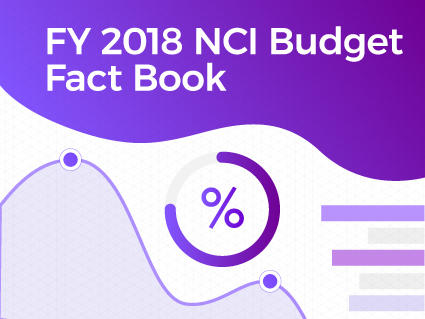New on NCI Websites for December 2018
, by NCI Staff
NCI’s collection of cancer information products is constantly growing, so periodically we provide updates on new and updated content of interest to the cancer community.
Fiscal Year 2018 NCI Budget Fact Book
The latest Budget Fact Book provides a summary of the distribution of NCI’s fiscal year 2018 budget among the institute’s research programs and funding mechanisms, as well as an explanation of NCI funding policies related to research grant awards.
President’s Cancer Panel Report
The President’s Cancer Panel concluded in its 2012–2013 report that underuse of human papillomavirus (HPV) vaccines is a serious but correctable threat to progress against cancer. In its new report, published in November, the panel provides an overview of progress in vaccine uptake over the past 5 years and presents priorities and strategies to accelerate vaccine uptake and eliminate the unnecessary burden of preventable HPV-related cancers.
Twitter Live—What's Next in Liver Cancer Research
NCI hosted its first Twitter Live event on October 30. NCI experts Anuradha S. Budhu, Ph.D., and Tim Greten, M.D., of NCI's Center for Cancer Research (CCR), joined Katherine McGlynn, Ph.D., of NCI's Division of Cancer Epidemiology and Genetics (DCEG), to discuss recent developments in research on liver cancer causes and prevention.
Video—The Role of Immunotherapy in Childhood Cancer Treatment
In a Facebook Live event held on October 25, NCI’s Nirali Shah, M.D., and Carlos Sandi of the St. Baldrick's Foundation discussed the role of immunotherapy in childhood cancers such as leukemia.
Redesigned Risk Assessment Tools
NCI’s Colorectal Cancer Risk Assessment Tool and Melanoma Risk Assessment Tool have been redesigned with usability-tested user interfaces and results pages, enhanced security features, and more accessible designs.
Latest Issue of the OCG e-Newsletter
The Office of Cancer Genomics (OCG) published issue 20 of their e-News in November. The articles provide program highlights and guest editorials, discuss data sharing facilitated by OCG’s Data Coordinating Center, and include a perspective piece from OCG staff member Eva Tonsing-Carter, Ph.D., on transitioning from the laboratory to program management.
CAR T-Cell Therapy Infographic
This illustration shows the steps for creating CAR T-cell therapies, a type of treatment in which a patient's T cells are changed in the laboratory so they will attack cancer cells. T cells are part of the immune system. To date, two CAR T-cell therapies have been approved by the Food and Drug Administration, to treat some forms of leukemia and lymphoma.
Cancer Center Cessation Initiative Video
A new video shows how NCI is working with cancer centers to build and implement programs to help people being treated for cancer quit tobacco. NCI’s Cancer Center Cessation Initiative, launched in 2017 as part of the Cancer Moonshot℠, aims to advance tobacco cessation efforts in cancer centers across the country.
New CCR Publication: Horizons
CCR has launched a new publication called Horizons to highlight areas of investigation likely to shape future research conducted by the center. The inaugural issue includes reports on new avenues for research on natural products, clinical trial design, and the study of rare tumors.
Fall Issue of Linkage Newsletter
DCEG has published the latest issue of its Linkage newsletter. The issue features an article on the emerging field of metabolomics and a profile of Britton Trabert, Ph.D., a DCEG researcher who studies the epidemiology of ovarian cancer and the hormonal causes of gynecologic cancers. The issue also includes highlights on the latest scientific publications and updates on staff achievements.
DCTD November Newsletter
NCI’s Division of Cancer Treatment and Diagnosis (DCTD) has published the November issue of its quarterly newsletter. This issue includes a profile of Jeff Abrams, M.D., recently retired associate director for the Cancer Therapy Evaluation Program, spotlights on the Cancer Diagnosis Program and Patient-Derived Models Repository, and recent news about DCTD programs and activities.
New Trichloroethylene Page
A new page on the NCI website explains what the chemical trichloroethylene (TCE) is, how people may become exposed to it, and what cancers are associated with TCE exposure. The TCE page is part of NCI's collection of pages about cancer-causing substances in the environment.
Chemotherapy and You
The popular patient education publication Chemotherapy and You: Support for People with Cancer has been updated with a new look and refreshed content, including information about precautions patients receiving chemotherapy should take at home.
Revised NCI Fact Sheets
The recently updated fact sheet on Menopausal Hormone Therapy and Cancer covers new research results on menopausal hormone therapy and includes information about benefits, risks, and how it affects the body.
The Primary Bone Cancer fact sheet was comprehensively revised. It addresses bone cancer statistics, the main types of primary bone cancer, possible causes, treatment, and the side effects of treatment.
NCI’s fact sheet on Cancer in Children and Adolescents now includes updated statistics, along with descriptions of the types, causes, and treatment of childhood cancers in the United States.
The Secondhand Smoke and Cancer fact sheet has been revised to make it easier to read and to include updated statistics and references.
Taking Time
The patient education booklet Taking Time: Support for People With Cancer has been revised with new content, updated contact information, and a new design.
PDQ Summary Updates
All sections of the breast cancer screening PDQ summary have been revised to reflect recent research results and to clarify information about newer screening methods.
The PDQ summary on testicular cancer treatment has been revised with updated descriptions of the different stages of this disease.
